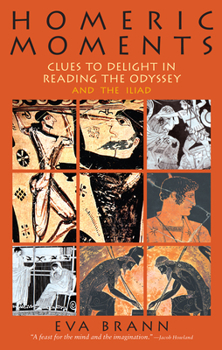Homeric Moments: Clues to Delight in Reading the Odyssey and the Iliad
Select Format
Select Condition 
Book Overview
Fifty years of reading Homer--both alone and with students--prepared Eva Brann to bring the Odyssey and the Iliad back to life for today's readers. In Homeric Moments, she brilliantly conveys the unique delights of Homer's epics as she focuses on the crucial scenes, or moments, that mark the high points of the narratives: Penelope and Odysseus, faithful wife and returning husband, sit face to face at their own hearth for the first time in twenty years; young Telemachus, with his father Odysseus at his side, boldly confronts the angry suitors; Achilles gives way to boundless grief at the death of his friend Patroclus.
Eva Brann demonstrates a way of reading Homer's poems that yields up their hidden treasures. With an alert eye for Homer's extraordinary visual effects and a keen ear for the musicality of his language, she helps the reader see the flickering campfires of the Greeks and hear the roar of the surf and the singing of nymphs. In Homeric Moments, Brann takes readers beneath the captivating surface of the poems to explore the inner connections and layers of meaning that have made the epics "the marvel of the ages."
"Written with wit and clarity, this book will be of value to those reading the Odyssey and the Iliad for the first time and to those teaching it to beginners."--Library Journal
"Homeric Moments is a feast for the mind and the imagination, laid out in clear and delicious prose. With Brann, old friends of Homer and new acquaintances alike will rejoice in the beauty, and above all the humanity, of the epics." --Jacob Howland, University of Tulsa, Author of The Paradox of Political Philosophy
"In Homeric Moments, Eva Brann lovingly leads us, as she has surely led countless students, through the gallery of delights that is Homer's poetry. Brann's enthusiasm is as infectious as her deep familiarity with the works is illuminating."--Rachel Hadas
"Brann invites us to enter a conversation about Homer] in which information and formal arguments jostle with appreciations and frank conjectures and surmises to increase our pleasure and deepen the inward dimension of our humanity."--Richard Freis, Millsaps College
"For anyone eager to experience the profundity and charm of Homer's great epic poems, Eva Brann's book will serve as a passionate and engaging guide. Brann displays a deep sensitivity to the cadence and flow of Homeric poetry, and the kind of knowing intimacy with its characters that comes from years of teaching and contemplation. Her relaxed but informative approach succeeds in conveying the grandeur of the great Homeric heroes, while making them continually resonate for our own lives. Brann helps us see that this poetry has an urgency for our own era as much as it did for a distant past."--Ralph M. Rosen, University of Pennsylvania, Author of Old Comedy and The Iambographic Tradition
"The most enjoyable books about Homer are always written by those who have read and taught him the most. Eva Brann's collection of astute observations, unusual asides, and visual snapshots of the Iliad and the Odyssey reveals a lifelong friendship with the poet, and is as pleasurable as it is informative. Homeric Moments is rare erudition without pedantry, in a tone marked by good sense without levity."--Victor Davis Hanson, author of The Other Greeks and co-author of Who Killed Homer?
Eva Brann is a member of the senior faculty at St. John's College in Annapolis, Maryland, where she has taught for fifty years. She is a recipient of the National Humanities Medal. Her other books include The Logos of Heraclitus, Feeling Our Feelings, Homage to Americans, Open Secrets / Inward Prospects, The Music of the Republic, Un-Willing, and Then and Now (all published by Paul Dry Books).





